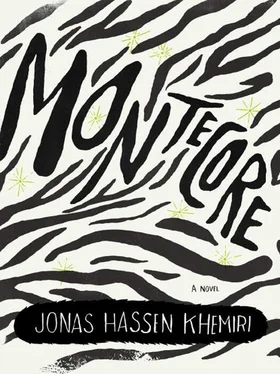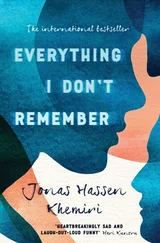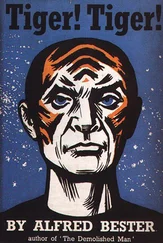1. Yes.
2. This is no surprise. Your father has undergone frequent reformations on the way to his late career’s success. He has wandered from a mute boy to a jeans-draped smile-dimpler to an amorous metro driver to a stressed studio owner to a world-celebrated photographer heroically fighting for the weak. That you do not continually recognize your father in my text is therefore to be expected. That you did not even recognize the background of his photographic interest is to me a tragic surprise.
3. No, definitely not!
4. Certainly you are correct that your father was also nicknamed by some in Jendouba as “the one with the elephant ears” and “the cookie lover.” I forgot to inform this. Has he said this himself, or was it one of his gabbing friends during your vacations in Tunisia? Was it Amine? If I had not been bound to serious work I could have been present with your family and nuanced their flapping tongues. And you — let us not exaggerate your father’s ear size or excess weight in the book. Soon the hairdresser hid his ears and the fatness was transformed with the years into supple biceps and a squared washboard.
5. Yes, certain things perhaps indicated the wordy interest that your father would inherit you. He had, for example, already when young, a tendency to inventory his own names for things. To his gray T-shirt he gave the name “the Silver Arrow.” His student room became “the Burrow.” His future touristic mademoiselles he called “Vanilla” (if they bore whiteness of skin) or “Chocochoc” (if they bore brownness of skin). The wit of words has, as you know, always attracted his boisterous humor. Presumably it is this specialty that has infected you with the ambition of an author.
6. No, neither “social services” nor “student aid” existed to support your father’s legal studies. But you are a very funny Swede who asks. However, we had much assistance from our friends from the orphanage. Not financial help but muscley. With their soon-scarred faces and broad muscles, Sofiane and Dhib protected us to safety — even if your father happened to swipe some dates or I happened to be accused of cheaterly card games.
7. He had many favorites; here are some examples:
The Fafafafafa song by Otis Redding
“Sittin’ on the Dock of the Bay” by Otis Redding
“Super Bad” by James Brown
“Love Man” by Otis Redding
8. Yes, your father has always had an expanded difficulty with people’s whispering tongues. The rumors of his love affair with Emir’s daughter gave broad frustration. “People’s curiosity is entirely too expanded” was a citation that he often pronounced. A recipe certain to cloud his mood was to say something of the character “My ear perceived that you were at the souk on Wednesday and invested this and this from him and him …” Then your father always denied and said, “Who has related this?” The emotion of being observed has always borne a great complication for your father. (According to your father this seems to have infected you too? Or what do you respond yourself, Monsieur Paranoid with Permanent Blinds? Señor Brown Velvet Curtain in the Room in Stockholm? [These words bear the tone of the humorist; do not let yourself be unnerved!])
9. Audrey Hepburn in front of the birdhouse. Or perhaps the photo of Ingrid Bergman. I’m not entirely sure.
10. “Smick” is of course the word that denotes our Tunisian minimum wage, didn’t you know that? And do you really not know the word “favorises”? In English it is given the name “sideburners.” It consists of the protruding beard that is localized in front of the ear, below the hair, extra common in disco dancers, motorcycle chauffeurs, and wolves. Do I have your understanding? An enlarged vocabulary is vital for your future career as an author.
11. Yes, your father’s pride has ALWAYS borne a prestige that we can hardly name adequately. One disappointment against your father, and its forgiveness is far away for years to come. This is your father’s character and he would gladly modify himself. But how difficult is it not to teach an antique dog new techniques?
Affixed you will find the describing of our rendezvous with Tabarka (and your father’s rendezvous with his first working camera).
Your refound friend,
Kadir
PS: Your suggestion to start our book in Sweden is interesting. But not correct. Recall your father citing the Baudelaire photographer Félix Nadar: “The best portrait is made by the person one knows best.” This rule also applies to authors. How can you (and the reader) know your father’s contours and understand his later actions without the forming of his historical history? Hopefully you recognize certain patterns in your father’s life as reflections of your own. Furthermore: To form what you call “prehistory” in Proustish flashbacks requires an author of monstrous talent. Do you really bear this? You who barely manage to formulate a single e-mail free from English words or spelling errors? No, to guard chronology is my directive.
The year was 1972 when your father and I dismissed our bodies from Jendouba’s cookie factory, packed our cardboard-like suitcases, and entered a collective louage with Tabarka as its destination. Our collection of finances had borne that particular industriousness that refers to the Japanese. With the economy’s status secured for a few weeks, we were on our way toward our new lives!!!
In the next scene we have stabilized our mutual lodging in a white paillote , a minimal one-room house with a straw roof, which at that time was localized on the beaches of Tabarka and hired out for scanty economy. At nighttime, small lizards zoomed over the interior of the roof without ever falling down. Perhaps you can consult these lizards as symbols for our existence? (“Like lizards our duo zoomed through life under the roof without ever felling their backs against that ruin which we call the floor.”)
Your father sought a position at Tabarka’s photographic laboratory while I obtained work as a dishwasher in the kitchen at Hôtel Majestique. While I rinsed silverware and glistened glasses, your father learned the foundations of film development. The friendly (but extremely cross-eyed) master, Achraf, received Abbas as an assistant and taught him how one temperature-verifies and agitates, stops and fixes, rinses and dries. How the development is followed by the printing, the stop bath by the fix bath, and how vital it is to carefully rinse away the fixer remains so that the photos will not yellow prematurely. The utensils that were found in Achraf’s laboratory were very simple: Achraf had painted the backdrops himself and named them titles like “Modern Love,” “Classic Love,” “Love in Venice,” as well as the comic “Asterix and Obelix.” The fix bath, which professional photographers usually only employ one time, was used by Achraf until the liquid was transformed into thick porridge. Instead of light meters, Achraf relied on his ticking intuition, and instead of gloves there were hands to dip the negatives in the developing bath.
The true creation in the process was initiated when Abbas had produced the negative and Achraf presented his paint box. Here was a pointed pencil with which he darkened the negative until the portrait’s face colors became exactly light enough that the customers looked like their ideals. Here were the Japanese paper colors that Achraf cultivated in order to carefully colorize the customers’ clothes to a perfect shade. Your father drank in all this knowledge with the thirst of a dry sponge.
Your father’s time was mostly occupied by passport portraits, but sometimes touristic customers, whose negatives always mirrored one another, arrived too. The same red-scorched, smiling tourist bodies in airy linens in front of the artist district of Sidi Bou Saïd, in the souk in Tunis, outside of the ruins of Carthage. In this historical time, tourism in Tabarka was growing weakly. Only two big hotels had opened their doors and the amount of European tourists was still limited. All of today’s deluxe options like parasailing, riding banana boats, or European daily journals lay far forward in time. No boutiques yet sold stuffed camels or humoristic T-shirts with texts like “I Love Tunisia” or “My Parents Went to Tunisia and All I Got Was This Lousy T-shirt.”
Читать дальше










